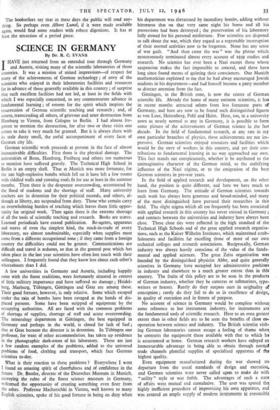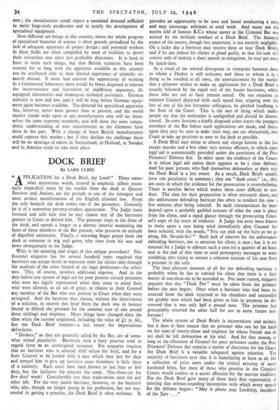SCIENCE IN GERMANY
By Dr. R. C. EVANS
IHAVE just returned from an extended tour through Germany and Austria, visiting many of the scientific laboratories of those countries. It was a mission of mixed impressions—of respect for many of the achievements of German technology ; of envy of the scientists who enjoyed in their laboratories facilities and resources far in advance of those generally available in this country ; of surprise that such excellent facilities had not led, at least in the fields with which I was especially concerned, to any commensurate advance in fundamental learning ; of esteem for the spirit which inspires the resurrection of German scientific teaching and research ; and, of course, transcending all others, of grievous and utter destruction from Hamburg to Vienna, from Cologne to Berlin. I had almost for- gotten to mention the destruction, for after two or three visits one comes to take it very much for granted. But it is always there with its stale dusty smell, the awful accompaniment of every facet of German city life.
German scientific work proceeds at present in the face of almost inconceivable difficulties. First there is the physical damage. The universities of Bonn, Hamburg, Freiburg and others too numerous to mention have suffered gravely. The Technical High School in Berlin is an empty shell. That at Munich was more fortunate, for the zoo high-explosive bombs which fell on it have left a few rooms with riddled walls and yawning roofs fit for use at least in the summer months. Then there is the desperate overcrowding, -accentuated by the flood of students and the shortage of staff. Many university teachers are in detention for their political records, and others, al- though at liberty, are suspended from duty. Those who remain carry an overwhelming burden of teaching which leaves them little oppor- tunity for original work. Then again there is the extreme shortage of all the tools of scientific teaching and research. Books are scarce. Learned periodicals have ceased publication. Re-agents, apparatus and stores of even the simplest kind, the stock-in-trade of every laboratory, are almost unobtainable, especially when supplies must come from a different occupational zone ; if they came from a foreign country the difficulties could not be greater. Communications are difficult and travel is arduous, so that in the general post which has taken place in the last year scientists have often lost touch with their colleagues. I frequently found that they knew less about each other's- whereabouts than I did.
A few universities in Germany and Austria, including happily some with the finest traditions, were fortunately situated in centres of little military importance and have suffered no 'damage ; Heidel- berg, Marburg, Tubingen, Gottingen and Graz are among these. Their good fortune, however, is only relative. Some which escaped under the ruin of bombs have been ravaged at the hands of dis- placed persons. Some have been stripped of equipment by the occupying authorities. All are faced with the common problems of shortage of supplies, shortage of staff and acute overcrowding. The mineralogy department at Gottingen, the best equipped in Germany and perhaps in the world, is closed for lack of fuel ; that at Graz because the director is in detention. In Tiibingen one professor, for want of other accommodation. has taken up residence in the photographic dark-room of his laboratory. These are just a few random examples of the problems, added to the universal problems of food, clothing and transport, which face German scientists- to-day.
What is their reaction to these problems ? Everywhere I went I found an amazing spirit of cheerfulness and of confidence in the future. Dr. Bassler, director of the Deutsches Museum in Munich, surveying the ruins of the finest science museum in Germany, welcomed the opportunity of creating something even finer from the ashes. Professor Machatschki in Vienna, well known to many English scientists, spoke of his good fortune in being on duty when
his department was threatened by incendiary bombs, adding without bitterness that on that very same night his home and all his possessions had been destroyed ; the preservation of his laboratory fully atoned for his personal misfortune. Few scientists are disposed to talk about the war, which they regard as a regrettable interruption of their normal activities now to be forgotten. None has any sense of war guilt. "And then came the war" was the phrase which monotonously terminated almost every account of 1939 studies and research. No scientist has ever been a Nazi except those whose suspension makes the fact impossible to conceal, and these have long since found means of quieting their consciences. One Munich mathematician explained to me that he had alway encouraged Jewish students in his department—and had himself become a party member to distract attention from the fact.
Gottingen, in the British zone, is now the centre of German scientific life. Already the home of many eminent scientists, it has in recent months attracted others from less fortunate parts of Germany, and here are now to be found such distinguished figures as von Lane, Heisenberg, Pohl and Hahn. Here, too, in a university town as nearly normal as any in Germany, it is possible to form some picture of the achievements of German science in the last decade. In the field of fundamental research, at any rate in my own particular branches of physics, these achievements are not im- pressive. German scientists enjoyed resources and facilities which would be the envy of workers in this country, and yet their con- tributions to fundamental learning in no way approached our own. This fact stands out conspicuously, whether it be attributed to the unimaginative character of the German mind, to the stultifying influence of the Nazi regime, or to the emigration of the best German scientists in pre-war years.
In the field of applied research and development, on the other hand, the position is quite different, and here we have much to learn from Germany. The attitude of German scientists towards such work has always been generous and broad-minded, and many of the most distinguished have pursued their researches in this field. The slight stigma which all too frequently has been associated with applied research in this country has never existed in Germany ; and contacts between the universities and industry have always been close. These close ties were reflected in the high standard of the Technical High Schools and of the great applied research organisa- tions, such as the Kaiser Wilhelm Institutes, which maintained estab-. lishments and facilities far excelling those of most of our own technical colleges and research associations. Reciprocally, German industry was always keenly conscious of the value of the funda- mental and applied sciences. The great Zeiss organisation was founded by the distinguished physicist Abbe, and quite generally scientists in Germany have occupied key administrative positions in industry and elsewhere to a much greater extent than in this' country. The fruits of this policy are to be seen in the products of German industry, whether they be cameras or submarines, type-1 writers or houses. Rarely do they surpass ours in originality ot, conception ; rarely do they fail to do so in excellence of design, in quality of execution and in fitness of purpose.
No account of science in Germany would be complete without some reference to her instrument industry, for instruments are the fundamental tools of scientific research. Here to an even greater extent than in other fields are to be seen- the benefits of close co-; operation between science and industry. The British scientist visit-, ing German laboratories cannot escape a feeling of shame when, he contrasts the equipment there available with that to which he is accustomed at home. German research workers have enjoyed an immeasurable advantage in being able to obtain through normal trade channels plentiful supplies of specialised apparatus of the highest quality.
Even equipment manufactured during the war showed no departure from the usual standards of design and execution, and German scientists were never called upon to make do with " utility " style or war finish. The advantages of such a state, of affairs were mutual and cumulative. The user was spared thet highly inefficient procedure of improvising his own apparatus, and was assured an ample supply of modern instruments at reasonable,
Cost ; the manufacturer could expect a sustained demand sufficient to merit large-scale production and to justify the development of specialised equipment.
How different are things in this country, where the whole progress of specialised branches of science is often gravely prejudiced by the lack of adequate apparatus of proper design ; and potential workers in these fields are often compelled by want of facilities to divert their researches into other less profitable directions. It is hard to have to write such things, but that British scientists have been content for so long with the apparatus available in this country can be attributed only to their limited experience of scientific re- search abroad. If more had enjoyed the opportunity of working in a Continental laboratory there would be fewer disposed to tolerate the inconvenience and frustration of indifferent apparatus, ill- equipped laboratories and inadequate technical assistance. German industry is now laid low, and it will be long before German equip- ment again becomes available. The demand for specialised apparatus has, however, never been greater than at present, and the world market stands wide open to any manufacturers who will set them- selves the same supreme standards, and will show the same sympa- thetic understanding of user requirements as the Germans have done in the past. With a change of heart British manufacturers could capture this market ; but if they decline the challenge there will be no shortage of others in Switzerland, in Holland, in Sweden and in America ready to take their place.































 Previous page
Previous page